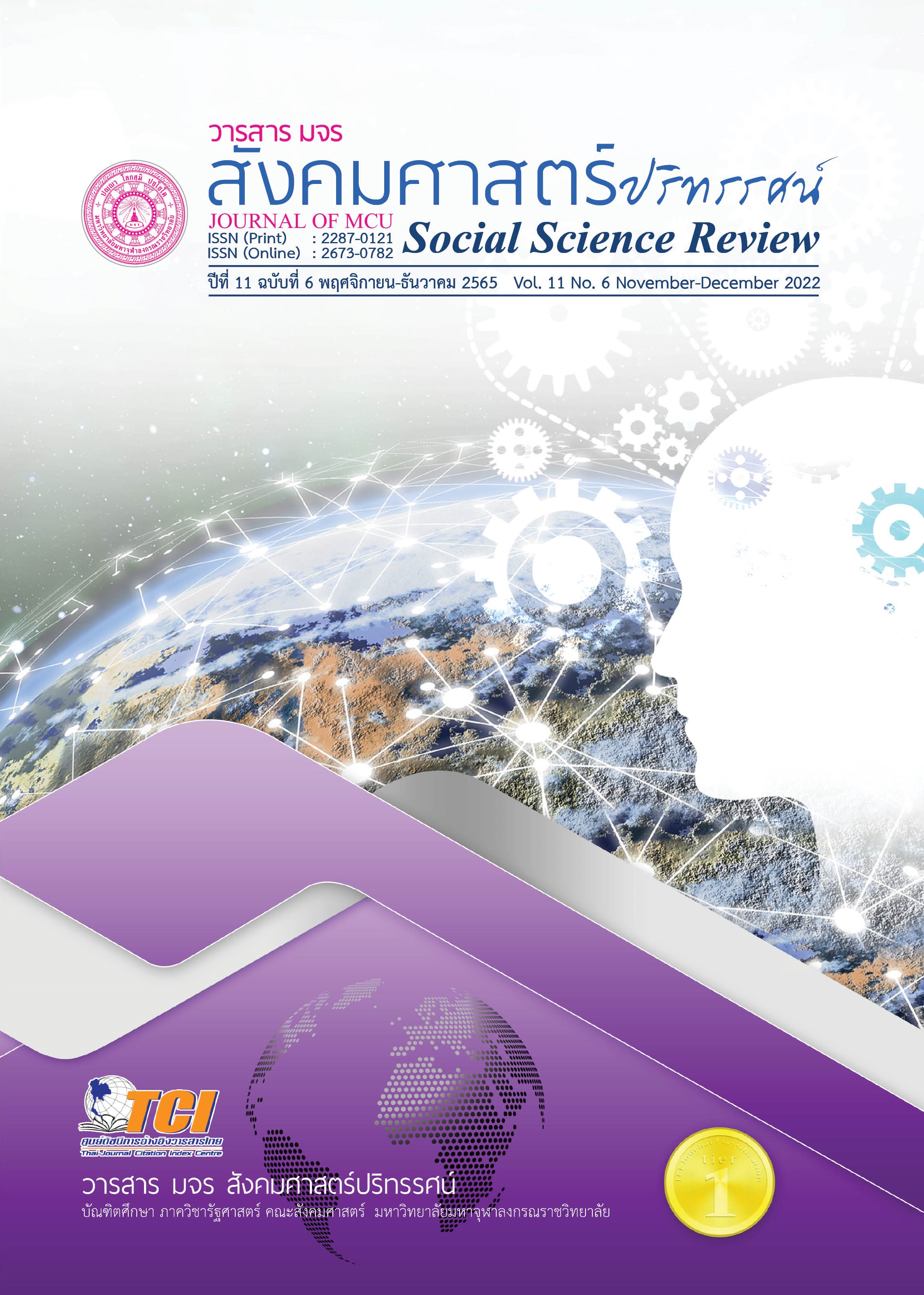วัคซีนโควิด-19 : ทางรอด หรือทางออก วิเคราะห์บนฐานอริยสัจ 4
คำสำคัญ:
วัคซีน, โควิด-19, อริยสัจ 4บทคัดย่อ
บทความนี้เป็นบทความวิชาการที่มุ่งประเด็นของมาตรการควบคุมโรคระบาดของโรคติดเชื้อไวรัสโควิด-19 นั้น ประชาชนต่างให้ความสำคัญและเห็นด้วยกับการควบคุมการแพร่กระจายของเชื้อไวรัสโควิด-19 โดยการฉีดวัคซีน ซึ่งสามารถตีความได้ว่าประเทศไทยได้เล็งเห็นถึงวิธีการรับมือเป็นที่เหมาะสมกับสถานการณ์ปัจจุบัน เนื่องจากโรคระบาดของเชื้อไวรัสโควิด-19 นั้นปัจจุบันอยู่ในระยะที่ 3 (Phase 3) มีการแพร่กระจายของเชื้อไวรัสภายในประเทศเป็นวงกว้าง และส่งผลกระทบต่อทั้งเศรษฐกิจและประชาชนเป็นอย่างมาก ซึ่งวิธีการป้องกันที่ดีที่สุด คือ การลดผลกระทบ (Mitigation) โดยชะลอการแพร่ระบาด ลดการเสียชีวิต ป้องกันการติดเชื้อภายในโรงพยาบาล ด้วยการให้วัคซีนป้องกันการติดเชื้อไวรัสโควิด-19 กับคนส่วนใหญ่ของประเทศ เพื่อสร้างภูมิคุ้มกันหมู่ และเมื่อนำหลักอริยสัจ 4 เข้ามาปรับใช้นั้น ทำให้ประชาชนและรัฐบาลได้ทราบถึงปัญหา (ทุกข์) คือ ทราบถึงที่มาและผลกระทบของโรคติดเชื้อไวรัสโควิด-19 เพื่อนำไปสู่การหาสาเหตุของปัญหา (สมุทัย) คือ ทราบสาเหตุของการระบาดในแต่ละระลอก ระยะที่ 1 2 และ 3 ส่งผลให้รัฐบาลมีการกำหนดนโยบายและมาตรการต่าง ๆ เพื่อควบคุมหรือจำกัดความเสียหายที่จะเกิดขึ้นได้อย่างเหมาะสม (นิโรธ) และขั้นตอนสุดท้ายคือสิ่งที่สำคัญที่รัฐบาลพึงกระทำหรือกระทำอยู่นั้น หมายรวมถึงความร่วมมือร่วมใจของประชาชนภายในประเทศ เพื่อดำเนินการตามแนวทางปฏิบัติที่นำไปสู่การแก้ปัญหา (มรรค) โดยภาพรวมได้นำเสนอตามกรอบของหลักอริยสัจ 4 อย่างครบถ้วน
เอกสารอ้างอิง
กรมควบคุมโรค. (2564). แนวทางการให้วัคซีนโควิด-19 ในสถานการณ์การระบาดปี 64 ของประเทศไทย. สืบค้น 15 สิงหาคม 2564, จาก https://ddc.moph.go.th/uploads/files/17295202103010.pdf
เกล็ดดาว จันทฑีโร. (2554). ปัจจัยที่มีผลต่อการฉีดวัคซีนป้องกันไข้หวัดใหญ่. วารสารศูนย์การศึกษาแพทยศาสตร์คลินิก โรงพยาบาลพระปกเกล้า, 23(2), 85-97.
โกมาตร จึงเสถียรทรัพย์. (2563). มานุษย์วิทยากับโรคระบาด: โคโรนาไวรัส โรคอุบัติใหม่กับงานวิจัยทางมานุษยวิทยา. กรุงเทพฯ: ศูนย์มานุษยวิทยาสิรินธร (องค์การมหาชน).
นิธินันท์ มหาวรรณ. (2562). ความสำคัญและแนวทางการศึกษาวัคซีนป้องกันโรคในประเทศไทย. วารสารวิจัย ระบบสาธารณสุข, 13(2), 234-240.
ป๋วย อุ่นใจ. (2564). สมรภูมิวัคซีนโควิด-19. กรุงเทพฯ: สำนักพิมพ์มติชน.
พระครูศรีปริยัติวิธาน. (2563). ความคิดเห็นของประชาชนต่อการป้องกันและรักษาโรคติดเชื้อโควิด-19. วารสารศิลปการจัดการ, 4(3), 521-536.
พระธรรมปิฎก (ป.อ.ปยุตฺโต). (2538). พุทธธรรม (ฉบับปรับปรุงและขยายความ). กรุงเทพมหานคร: มหาจุฬาลงกรณราชวิทยาลัย.
พระพรหมคุณาภรณ์ (ป.อ.ปยุตฺโต). (2558). พจนานุกรมพุทธศาสตร์ ฉบับประมวลธรรม. กรุงเทพฯ: สำนักพิมพ์ผลิธัมม์.
พระเมธีธรรมาภรณ์ (ประยูร ธมฺมจิตฺโต). (2539). พุทธศาสนากับปัชญา. กรุงเทพฯ: สำนักพิมพ์อมรินทร์พริ้นติ้ง กรุ๊บ จำกัด.
วศิน อินทสระ. (2554). อริยสัจ 4 ความจริงของชีวิตที่ทุกคนควรรู้และเข้าใจ. กรุงเทพฯ: สำนักพิมพ์ธรรมดา.
วิทยากร เชียงกูล. (2564). สร้างระบบเศรษฐกิจสังคมใหม่ยุควิกฤตโควิด-19. กรุงเทพฯ: สำนักพิมพ์มูลนิธิสถาบันวิชาการ 14 ตุลา.
ศุภสิทธิ์ พรรณนารุโณทัย. (2563). จะผ่านพ้นวิกฤตโลก โควิด-19 ระบาด ด้วยฐานความรู้และการปฏิบัติ. วารสารวิจัยระบบสาธารณสุข, 14(1), 1-6.
สถาบันวิจัยเพื่อการพัฒนาประเทศไทย. (2564). การควบคุมการระบาดของโควิด-19 และการบริหารจัดการวัคซีน. สืบค้น 20 สิงหาคม 2564, จาก http://tdri.or.th/2021/07/report-2years-prayut-cabinet2
ดาวน์โหลด
เผยแพร่แล้ว
รูปแบบการอ้างอิง
ฉบับ
ประเภทบทความ
สัญญาอนุญาต
ลิขสิทธิ์ (c) 2022 วารสาร มจร สังคมศาสตร์ปริทรรศน์

อนุญาตภายใต้เงื่อนไข Creative Commons Attribution-NonCommercial-NoDerivatives 4.0 International License.
เพื่อให้เป็นไปตามกฎหมายลิขสิทธิ์ ผู้นิพนธ์ทุกท่านต้องลงลายมือชื่อในแบบฟอร์มใบมอบลิขสิทธิ์บทความให้แก่วารสารฯ พร้อมกับบทความต้นฉบับที่ได้แก้ไขครั้งสุดท้าย นอกจากนี้ ผู้นิพนธ์ทุกท่านต้องยืนยันว่าบทความต้นฉบับที่ส่งมาตีพิมพ์นั้น ได้ส่งมาตีพิมพ์เฉพาะในวารสาร มจร สังคมศาสตร์ปริทรรศน์ เพียงแห่งเดียวเท่านั้น หากมีการใช้ภาพหรือตารางหรือเนื้อหาอื่นๆ ของผู้นิพนธ์อื่นที่ปรากฏในสิ่งตีพิมพ์อื่นมาแล้ว ผู้นิพนธ์ต้องขออนุญาตเจ้าของลิขสิทธิ์ก่อน พร้อมทั้งแสดงหนังสือที่ได้รับการยินยอมต่อบรรณาธิการ ก่อนที่บทความจะได้รับการตีพิมพ์ หากไม่เป็นไปตามข้อกำหนดเบื้องต้น ทางวารสารจะถอดบทความของท่านออกโดยไม่มีข้อยกเว้นใดๆ ทั้งสิ้น





